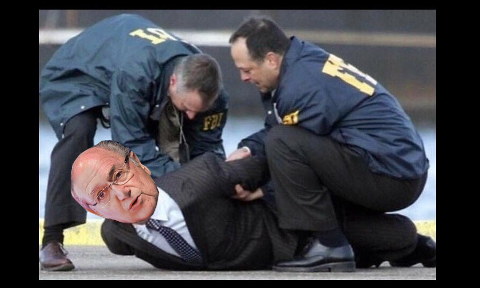

THE EPO may be Europe's most lawless place. One can be charged at any time, with made up allegations, then dismissed and prevented from seeking future employment (without risking loss of one's pension).
"One can be charged at any time, with made up allegations, then dismissed and prevented from seeking future employment (without risking loss of one's pension)."It gets even worse than this. For nearly two months we have been writing about how the EPO 'deletes' holidays. It effectively forces staff to show up at work on public/national holidays. SUEPO wrote about it last week, but then deleted it (we had made a copy, thankfully fast enough). It now says something about it to the Munich-based staff (under SUEPO Munich). Here is the introduction:
On 31 October 1517 a German monk, Martin Luther, nailed his Ninety-five Theses on the door of the All Saints' Church in Wittenberg thereby initiating what is called the Reformation. For the 500th anniversary of the Reformationsday, 31 October will be a lawful holiday in all of Germany, but not at the EPO. It is now time for SUEPO Munich to publish its own Theses.
You ask why the EPI makes no protest when the AC connives with BB to trash the Rule of Law. It seems obvious to me: The Officers and Members of the EPI are frightened of losing their corporate clients.
The corporations have an interest in driving down the level of human rights that protect their employees. What could suit their purposes better, than 38 Sovereign States acquiescing in demolition of those human rights. After that, those governments cannot criticise a corporate employer for doing no worse than the government itself, as employer.
So, the corporations will not look kindly on any firm of patent attorneys that leaps to the defence of employees at the EPO. To the contrary; such firms will find that they start to get less work from their corporate clients.
Remember, a multi-national corporation is an entity without any morals. It is itinerant (a citizen of nowhere) driven only to reward its owners, the shareholders. To them must be delivered their quarterly return, their dividend, regardless what it costs. Human rights don’t show up on the balance sheet.
I think that the reasons for inaction of the professional associations (including the epi) are many, varied and complex. However, I would be very surprised if, for many of them, a key reason is an inclination to maintain influence by not rocking the boat too vigorously. This is likely to be a key factor for the “rebel” AC delegations too.
It is therefore beyond tragic that the current President appears to have discovered how to ruthlessly exploit this inclination of the AC and the professional representatives. Whilst it is impossible at this stage to be certain precisely how he does this, certain strategies stand out as obvious candidates.
The first theoretical possibility is bending / breaking the rules and then only later asking for the AC to sanction the actions taken.
The second theoretical possibility is securing (by fair means or foul) the undying loyalty of a sufficient number of AC delegates, and then ensuring that the stance taken by those delegates makes it “too difficult” for the “rebel” AC delegates to ever win the day on any meaningful issue.
The third theoretical possibility is deliberately presenting an outrageously bad proposal that contains some “straw men” upon which the “rebel” AC delegates can expend their energy and influence fighting. The second part of this strategy is to then, with great theatrics intended to give the impression of extreme reluctance, agree to changing points that do not matter to you… but only on the condition that other points (which were the ones you really wanted in the first place) remain without amendment.
I think that we can all agree that the first of these three strategies has been deployed on at least one occasion. I leave it for those intimately familiar with the workings of the AC to comment upon whether the other two have also been deployed.
With so many ways for the President of the EPO to exploit a key weakness of the AC, it is perhaps no coincidence that there is so much evidence of the tail appearing to wag the dog. The question is, which line does the President have to cross before the AC decides to tackle the problem head-on?
Events that have so far not provoked the AC into action include: a Board of Appeal ruling that the President had attempted to undermine their independence; a national court ruling that the EPO has not respected certain human rights; refusal of the President to obey a direct order from the AC in connection with disciplinary proceedings relating to staff representatives; and trashing of the EPO’s reputation (in particular with regard to quality, as well as failure to uphold the rule of law).
I would have expected any one of those developments to provoke a furious response from the AC. The fact that there has been no response after so many developments suggests that we can be fairly confident that the seeds of the EPO’s destruction will have been sown and nurtured, and will be starting to bear fruit before the AC realises how serious the situation has already become.